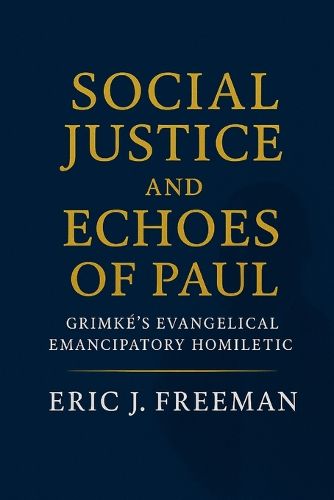Readings Newsletter
Become a Readings Member to make your shopping experience even easier.
Sign in or sign up for free!
You’re not far away from qualifying for FREE standard shipping within Australia
You’ve qualified for FREE standard shipping within Australia
The cart is loading…






This title is printed to order. This book may have been self-published. If so, we cannot guarantee the quality of the content. In the main most books will have gone through the editing process however some may not. We therefore suggest that you be aware of this before ordering this book. If in doubt check either the author or publisher’s details as we are unable to accept any returns unless they are faulty. Please contact us if you have any questions.
: e' examines the life and ministry of Francis James Grimke (1850-1937), a Reformed evangelical pastor and formerly enslaved thinker whose bold preaching engaged systemic injustice with biblical fidelity and prophetic clarity. Bridging historical theology, Pauline studies, and homiletics, this volume introduces Grimke's Evangelical Emancipatory Homiletic (EEH)-a preaching model that integrates doctrinal soundness, social awareness, and pastoral courage. Drawing deeply from the Apostle Paul's letters and echo traditions, Grimke's sermons modeled a gospel witness that refused to separate personal salvation from public justice. Through a close analysis of Grimke's theological formation, exegetical method, and rhetorical strategies, Dr. Eric J. Freeman constructs a biblically grounded homiletic framework rooted in four evangelical priorities: biblicism, crucicentrism, conversionism, and activism. Designed for use in seminary classrooms and theological institutions, this work offers a robust pedagogical and theological resource for students of preaching, ethics, and Black church history. Yet its accessible tone and practical insight also make it a valuable guide for pastors, ministry leaders, and gospel practitioners seeking to proclaim Christ faithfully in the face of contemporary social divisions. Whether used as a textbook or studied independently, challenges readers to recover a preaching ethic that is both theologically rigorous and prophetically engaged-echoing the Pauline tradition in word, witness, and public proclamation.
$9.00 standard shipping within Australia
FREE standard shipping within Australia for orders over $100.00
Express & International shipping calculated at checkout
Stock availability can be subject to change without notice. We recommend calling the shop or contacting our online team to check availability of low stock items. Please see our Shopping Online page for more details.
This title is printed to order. This book may have been self-published. If so, we cannot guarantee the quality of the content. In the main most books will have gone through the editing process however some may not. We therefore suggest that you be aware of this before ordering this book. If in doubt check either the author or publisher’s details as we are unable to accept any returns unless they are faulty. Please contact us if you have any questions.
: e' examines the life and ministry of Francis James Grimke (1850-1937), a Reformed evangelical pastor and formerly enslaved thinker whose bold preaching engaged systemic injustice with biblical fidelity and prophetic clarity. Bridging historical theology, Pauline studies, and homiletics, this volume introduces Grimke's Evangelical Emancipatory Homiletic (EEH)-a preaching model that integrates doctrinal soundness, social awareness, and pastoral courage. Drawing deeply from the Apostle Paul's letters and echo traditions, Grimke's sermons modeled a gospel witness that refused to separate personal salvation from public justice. Through a close analysis of Grimke's theological formation, exegetical method, and rhetorical strategies, Dr. Eric J. Freeman constructs a biblically grounded homiletic framework rooted in four evangelical priorities: biblicism, crucicentrism, conversionism, and activism. Designed for use in seminary classrooms and theological institutions, this work offers a robust pedagogical and theological resource for students of preaching, ethics, and Black church history. Yet its accessible tone and practical insight also make it a valuable guide for pastors, ministry leaders, and gospel practitioners seeking to proclaim Christ faithfully in the face of contemporary social divisions. Whether used as a textbook or studied independently, challenges readers to recover a preaching ethic that is both theologically rigorous and prophetically engaged-echoing the Pauline tradition in word, witness, and public proclamation.